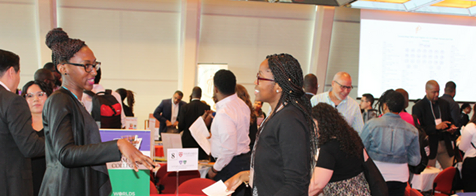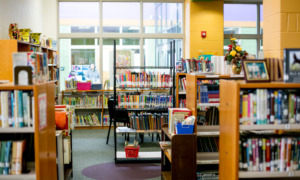
Partnership for After School Education
.
A college fair on Friday in New York City will be a college fair with a difference, bringing together after-school programs with college admissions representatives.
The event helps such programs guide students through the college admission process and shows that colleges are looking at the programs as partners in recruiting students.
One youth organization that will be in attendance is Stoked, a Brooklyn-based nonprofit whose mission is to empower underserved youth. Stoked also has branches in Chicago and Los Angeles.
“As a community-based organization our role [at the fair] is to network with colleges and figure out what opportunities are available for our students,” said Valete Graham, development manager at Stoked.
He first attended the college fair last year.
“The most valuable thing was we were able to set up visits with admissions counselors,” he said. A handful came by the Stoked office in Brooklyn to talk to students.
The visits gave students a comfortable, less intimidating space in which to talk to college representatives, he said. And students learned more about what to look for in a college, he said.
Six years ago, the Partnership for After School Education (PASE) in New York City put together its first college fair. PASE is a nonprofit that provides support and training for New York after-school providers, particularly those serving children and teens living in poverty.
“We started the idea of a college fair for community-based organizations working on college prep,” said Alison Overseth, executive director of PASE.
Seventeen colleges and 50 community-based after-school providers took part. In five years, the fair grew to 47 colleges and 106 community organizations, Overseth said. The event is held at New York University, which is also a sponsor.
Guidance toward college is a crucial need for marginalized and low-income students, and after-school organization fill a critical role, according to PASE.
Latino, African-American and recent immigrant students are likely to be in high schools that are understaffed and provide inadequate college advice and counseling. Students who are the first generation in their family to head to college may lack family knowledge about college. Recent immigrants, including those families who have college experience in their home countries, may not understand the American system.
The fair helped the staff at Stoked make more informed recommendations to its students, Graham said.
After-school providers can ask colleges, “Can you support my first-generation African-American college students?” Overseth said. After-school staff can find out whether the college orientation is adequate for those students and whether affinity groups and other types of support exist, she said.
“That right fit makes a difference,” Overseth said. The idea is to bring together “all the things that a young person needs to have to be successful,” she said.
Colleges are now “starting to get the idea that community-based organizations can be a great resource for them,” Overseth said.
Colleges are saying they’ve screened students for academic abilities, but they need students who are also prepared socially and emotionally, she said. They’re looking for diverse students and they need students who can advocate for themselves, who can ask for help and who will make use of college advisors, she said.
Building these social and emotional skills is what after-school programs have been doing, she said.































